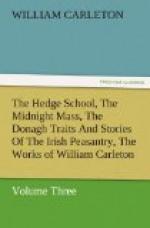* * * * *
The story of the Donagh, the Author has reason to believe, was the means of first bringing this curious piece of antiquity into notice. There is little to be added here to what is in the sketch, concerning its influence over the people, and the use of it as a blessed relic sought for by those who wished to apply a certain test of guilt or innocence to such well known thieves as scrupled not to perjure themselves on the Bible. For this purpose it was a perfect conscience-trap, the most hardened miscreant never having been known to risk a false oath upon it. Many singular anecdotes are related concerning it.
The Author feels great pleasure in subjoining two very interesting letters upon the subject—one from an accomplished scholar, the late Rev. Dr. O’Beirne, master of the! distinguished school of Portora at Enniskillen; the other from Sir William Betham, one of the soundest and most learned of our Irish Antiquaries. Both gentlemen differ in their opinion respecting the antiquity of the Donagh; and, as the author is incompetent to decide between them, he gives their respective letters to the public.
“"Portora, August 15, 1832.
“"My Dear Carleton.—It is well you wrote to me about the Dona. Your letter, which reached me this day, has proved that I was mistaken in supposing that the promised drawing was no longer necessary. I had imagined, that as you must have seen the Dona with Mr. Smith, any communication from me on the subject must be superfluous. And now that I have taken up my pen in compliance with your wish, what can I tell you that you have not perhaps conveyed to yourself by ocular inspection, and better than I can detail it?
“"I accompanied Mr. S. to Brookborough, and asked very particularly of the old woman, late the possessor of the Dona, what she knew of its history; but she could say nothing about it, only that it had belonged to ‘The Lord of Enniskillen.’ This was the Fermanagh Maguire, who took an active part in the shocking rebellion of 1641, and was subsequently executed. His castle, the ruins of which are on the grounds of Portora, was stormed during the wars of that miserable time. When I entered on my inquiries for you, I anticipated much in the way of tradition, which, I hoped, might prove amusing at least; but disappointment met me on every hand. The old woman could not even detail distinctly how the Dona had come into her possession: it was brought into her family, she said, by a priest. The country people had imagined wonders relative to the contents of the box. The chief treasure it was supposed to contain was a lock of the Virgin Mary’s hair!!!
“"After much inquiry, I received the following vague detail from a person in this country; and let me remark, by the by, that though the possession of the Dona was matter of boast to the Maguires, yet I could not gain the slightest information respecting it from even the most intelligent of the name. But now for the detail:—




